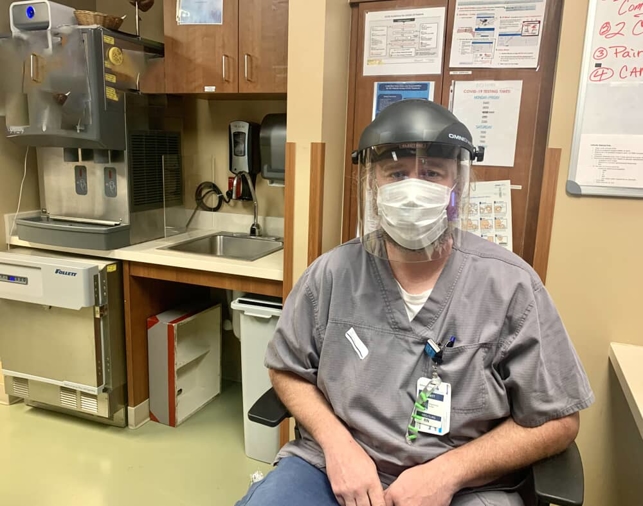
Stories from the frontlines: ICU nurse shares his experience of caring for COVID-19 patients
(Tuesday, September 29, 2020, Willits, CA) -- As healthcare workers continue to care for the community, including COVID-19 patients, staff from Adventist Health Howard Memorial sharing their stories on what it’s like being on the front lines and asking the community to do their part to help stop the spread.
As an ICU nurse, Matt Gaynor, RN has been caring for COVID patients since the pandemic hit. While they are called “heroes” these days, Gaynor says, he’s just a nurse doing his job –caring for people like he always had. “I don’t see myself as a hero. I’m a nurse, that’s what I’m expected to do, and I’m given the tools I need to do my job and protect myself. I think our essential workers, such as grocery store clerks and restaurant workers are heroes because they don’t as much protection as I do, and they don’t get paid the same way and yet they take on the same risks as we do. They didn’t sign up for this kind of work. I did. I also think our housekeepers are heroes. They work very hard and put their lives on the line.”
While their work has become more complicated and comes with more risk, Gaynor says it never stopped him from wanting to go to work. “I tell my fellow nurses, at some point in your nursing career, you’re going to have to make a decision, whether or not you’re going to go to work. This is the first of many that we will have to make that decision. I have about 25 to 30 years of my nursing career left. To me, it’s just pandemic number oneof a long line of things that will be coming our way. There will be more times we will do something we’ve never done before; we will deal with something completely unknown and scary. I will be here for all of it. Because this is what I signed up for. I’m a nurse.“
Gaynor says he’s less concerned about himself but more about his family that’s why he takes every precaution possible, especially for his parents who are high-risk and elderly. “My mom who’s a volunteer here would do anything to be back. But she knows it’s not safe. I can’t really stay away from them or not see them because they need me since they have health issues that’s why I just try to be very careful.”
Gaynor says the most challenging part of caring for COVID patients is the isolation and not being able to have family at the bedside, especially when prior to the pandemic Howard has always had a reputation for its family atmosphere. “It’s challenging having to explain to their family that they can’t come in, it’s hard for the family and for us. We’ve always prided ourselves here, that what makes us unique is the family atmosphere. It’s hard for patients when they are in a new place, having to deal with people they don’t know, someone poking you, it’s hard for them not having that support. And it’s hard for us to watch and having to be the one to explain to the family that they can’t be with their loved one for their own protection. So these days, I always try to bend over backwards and go above and beyond for the family, I call them a lot to keep them updated so they don’t worry.I check-in on them a lot, making sure I answer all their questions and address their concerns,” he shares.
While times have been challenging, Gaynor says the one thing he will take away from this experience is the importance of family, especially in healthcare. He explains, “Support from family member or just being able to be there for their loved ones who are sick makes a difference in their healing. It’s hard to watch, when they can’t kiss or hug their family members, especially when someone passed away. We did our best with using technology and connecting them via video calls. But it’s not the same. That personal connection, human touch, being able to hug or touch is so important to not only what we do but also in our everyday lives. That’s one thing I will always try to remember and make it a point to bend over backwards to make sure our patients have that family connection.”
Even as our cases are going down in Mendocino County, Gaynor says he’s more worried about what’s coming and the confluence of flu and pneumonia season, usually already busy time for hospitals, along with a pandemic.
“I’m concerned about the triple whammy of these conditions. You can have a virus and a bacterial infection at the same time. And we use the same resources to deal with COVID-19 as we would for flu and pneumonia. It’s something we’ve never had to deal with before.”
That’s why Gaynor asks everyone to continue taking precautions and doing their part. “This is real, and we need to take this seriously. Your protection isn’t just for yourself, it’s for the people around you and those you love. Wear a mask and wash your hands. Be part of the team. As nurses, we need you to be part of the team so that when the wave does hit, we will be able to handle it. And we can save lives.”


